Important: The GCConnex decommission will not affect GCCollab or GCWiki. Thank you and happy collaborating!
Conférence sur les données du GC 2023/Découvrez-en plus sur les données

vExpo | Programme | Conférenciers | Réseautage | Découvrez-en plus sur les données 2022 |
La Conférence sur les données du GC 2023 est une initiative d'Innovation, Sciences et Développement économique Canada et l'École de la fonction publique du Canada avec le soutien de la Communauté des données du GC.
Découvrez-en plus sur les données 2023
Il nous manque quelque chose ? Envoyez-nous les détails : Communauté des données du GC
Présentations de la Conférence sur les données du GC
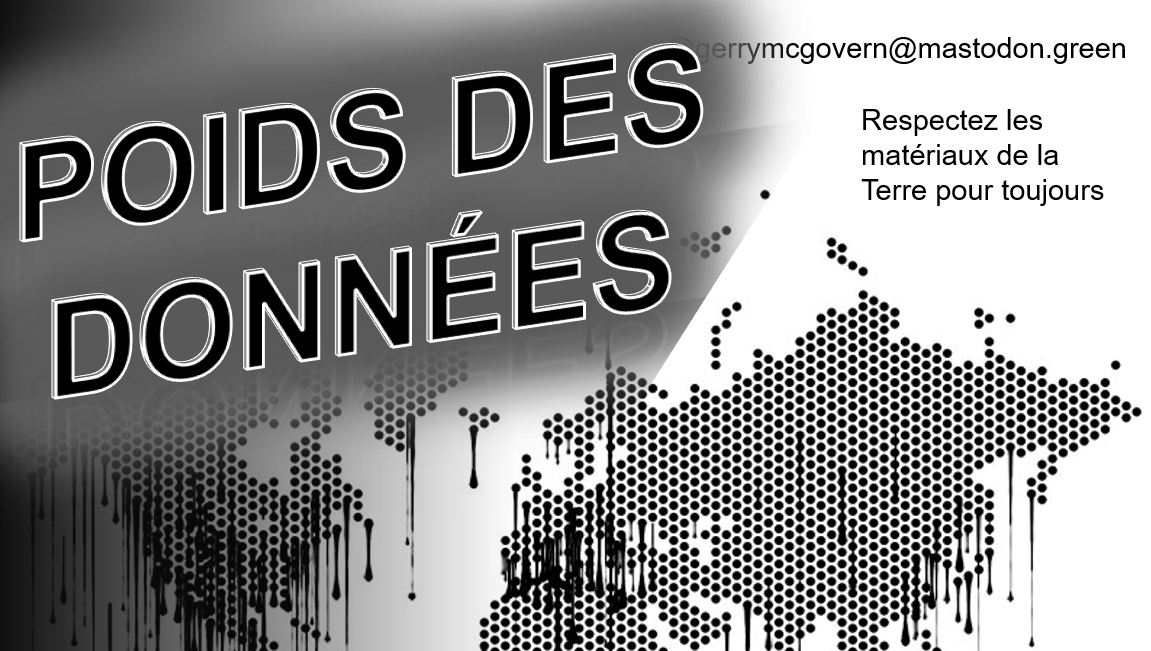
Discours-programme de Gerry McGovern – Le poids environnemental des données
Présentation de Gerry McGovern sur la session « Le poids environnemental des données » lors de la Conférence sur les données du GC 2023.
Renouvellement de la stratégie relative aux données pour la fonction publique fédérale
Présentation de Stephen Burt, Dirigeant principal des données du Canada, Secrétariat du Conseil du Trésor du Canada Kara Beckles, Dirigeante principale des données, Bureau du Conseil privé, et Eric Rancourt, Statisticien en chef adjoint, Statistique Canada sur « Renouvellement de la stratégie relative aux données pour la fonction publique fédérale » lors de la Conférence sur les données du GC 2023.
Événements et possibilités de faire partie
Série L’impact des données: Créer des centres de données efficaces
Cet événement, dont le thème sera « permettre des services axés sur les données », portera sur l’utilisation des carrefours de données au sein de la fonction publique et sur la façon dont ceux-ci appuient la stratégie fédérale renouvelée en matière de données.
29 mars 2023 | 1 heure | En ligne
Consultation Norme sur la gestion des métadonnées (GCpedia)
Une nouvelle Norme sur la gestion des métadonnées est en cours d’élaboration afin de remplacer la Norme sur les métadonnées. Le but de cette nouvelle Norme est d’aller au-delà de l’utilisation des métadonnées pour appuyer la gestion des données et saisir les exigences qui assureront une gestion stratégique, efficiente et efficace des métadonnées, tant pour l’information que les données, à l’échelle du GC. Vous pouvez partager vos idées, vos commentaires et vos réactions pour faire en sorte que la Norme sur la gestion des métadonnées soit complète, exacte, claire, utile et réaliste. Veuillez nous envoyer vos commentaires avant le 10 mars.
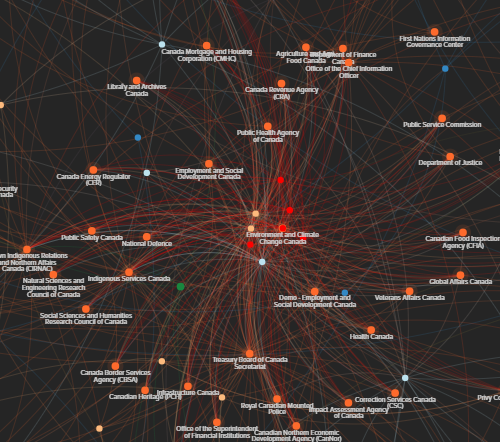
Écosystème de données du GC (GCpédia)
L'initiative de l'Écosystème du GC conserve et relie une collection d'entités provenant du secteur public, qui comprend des groupes, des politiques, des ressources, des ensembles de données et des dizaines d'autres types de choses liées aux priorités du gouvernement fédéral. Rejoignez la communauté.
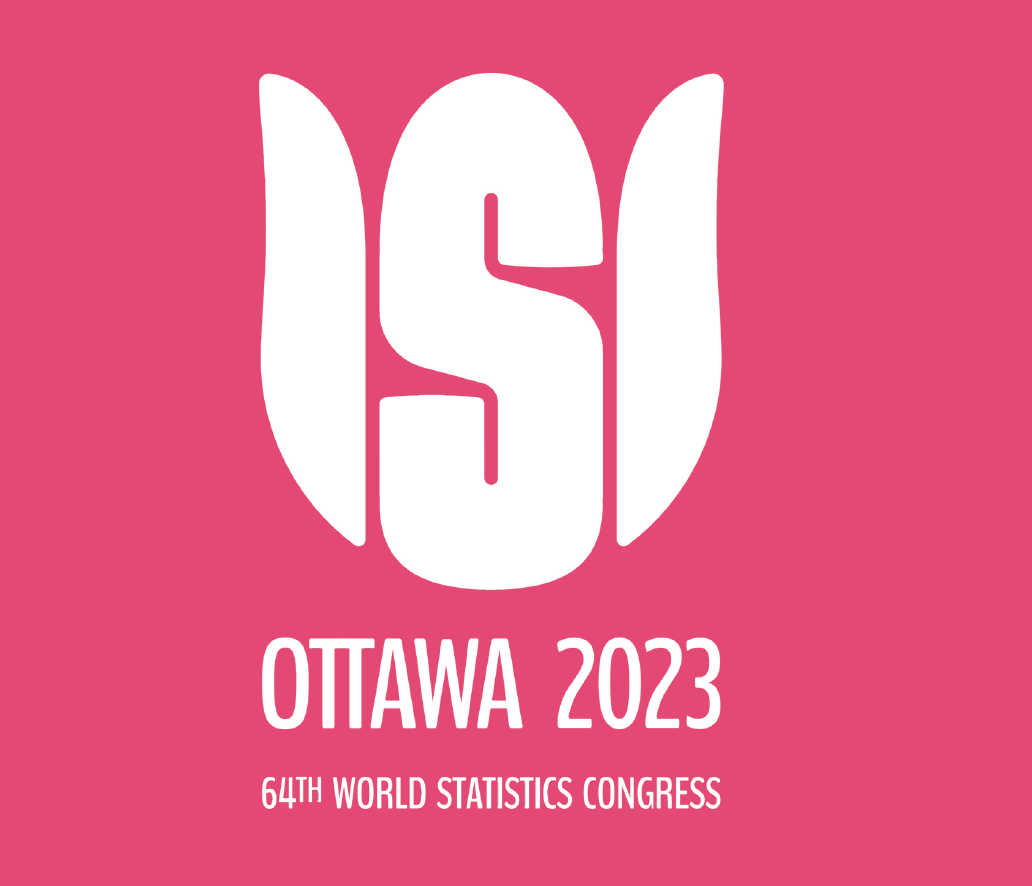
Congrès mondial de la statistique 2023
(En anglais seulement) Le 64e Congrès mondial de la statistique 2023 de l'Institut international de statistique est l'événement principal sur la statistique et la science des données dans le monde entier. Il est organisé tous les deux ans depuis 1887 par l'Institut international de statistique. Le Congrès mondial de la statistique 2023 rassemble plus de 2 000 statisticiens et scientifiques des données provenant du monde académique, de la statistique officielle, du secteur de la santé et des entreprises, des professionnels juniors et seniors, dans un environnement invitant.
16-20 juillet 2023 | En-personne - Ottawa, Canada
Livres et rapports
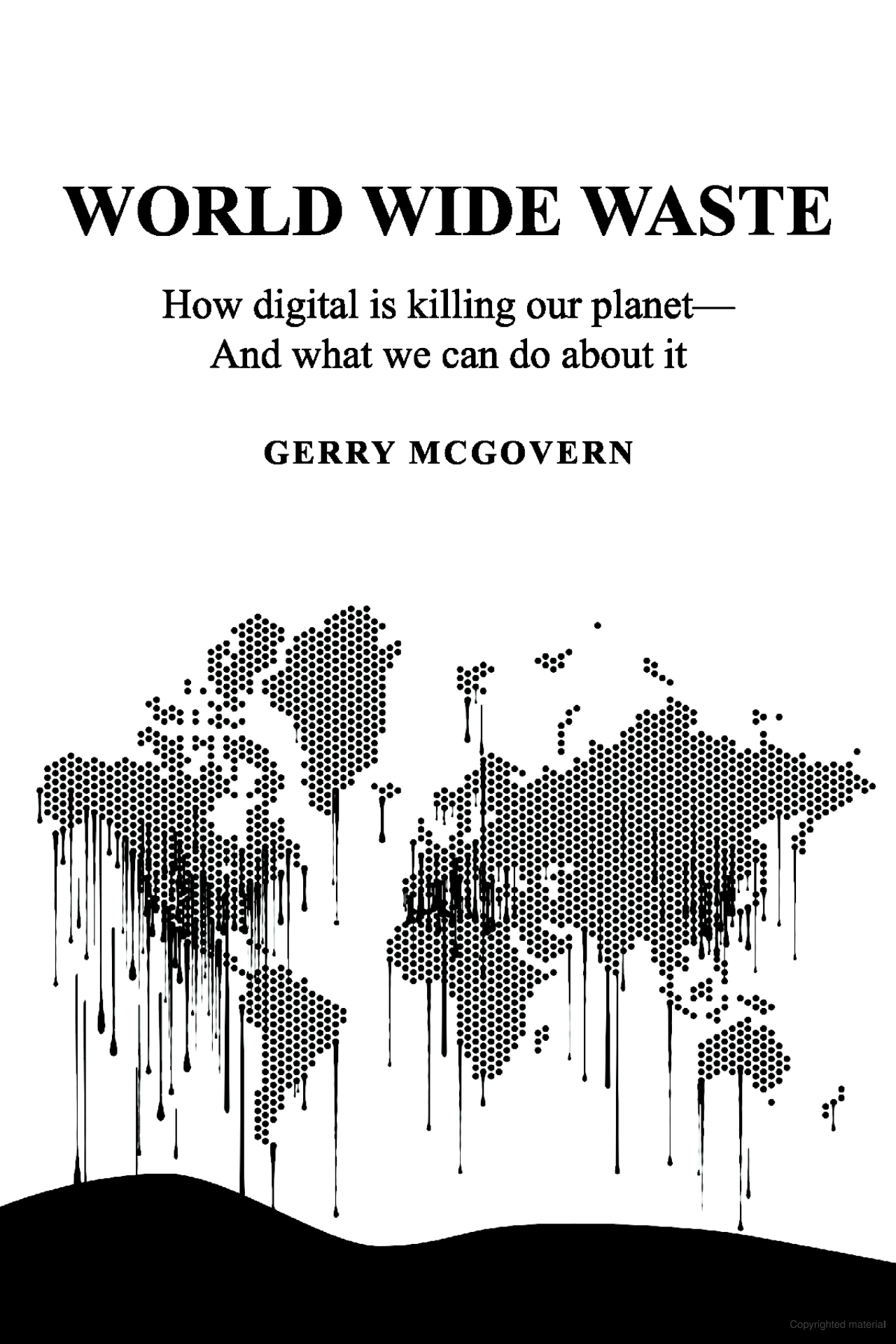
World Wide Waste
(En anglais seulement) Speaking out when it’s unpopular. Back in the day, Henry David Thoreau raged at the robber barons—the big shots of their age, despoiling the environment in the name of progress. Deep in the throes of the seemingly unstoppable growth of tech, a modern-day Thoreau has emerged in the guise of Gerry McGovern—decrying the massive, hidden negative impacts of tech on the environment. McGovern has thoroughly documented in World Wide Waste how tech damages the Earth—and what we should be doing about it. It is not just the acres of discarded computer hardware conveniently dumped in Third World countries. Every time an email is downloaded it contributes to global warming. Every tweet, search, check of a webpage creates pollution. Digital is physical. Those data centers are not in the Cloud. They’re on land in massive physical buildings packed full of computers hungry for energy. It seems invisible. It seems cheap and free. It’s not. Digital costs the Earth.
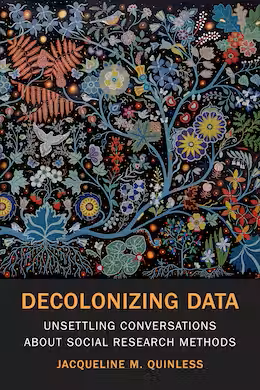
Decolonizing Data: Unsettling Conversations about Social Research Methods
(En anglais seulement) Decolonizing Data explores how ongoing structures of colonialization negatively impact the well-being of Indigenous peoples and communities across Canada, resulting in persistent health inequalities. In addressing the social dimensions of health, particularly as they affect Indigenous peoples and BIPOC communities, Decolonizing Data asks, Should these groups be given priority for future health policy considerations? Decolonizing Data provides a deeper understanding of the social dimensions of health as applied to Indigenous peoples, who have been historically underfunded in and excluded from health services, programs, and quality of care; this inequality has most recently been seen during the COVID-19 pandemic. Drawing on both western and Indigenous methodologies, this unique scholarly contribution takes both a sociological perspective and the "two-eyed seeing" approach to research methods. By looking at the ways that everyday research practices contribute to the colonization of health outcomes for Indigenous peoples, Decolonizing Data exposes the social dimensions of healthcare and offers a careful and respectful reflection on how to "unsettle conversations" about applied social research initiatives for our most vulnerable groups.
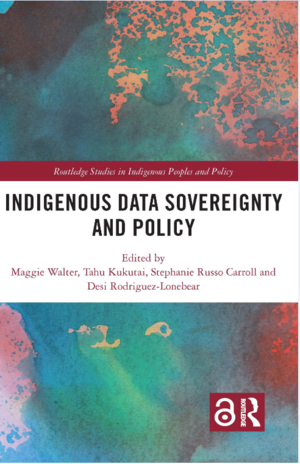
Indigenous Data Sovereignty and Policy
(En anglais seulement) This book examines how Indigenous Peoples around the world are demanding greater data sovereignty, and challenging the ways in which governments have historically used Indigenous data to develop policies and programs.
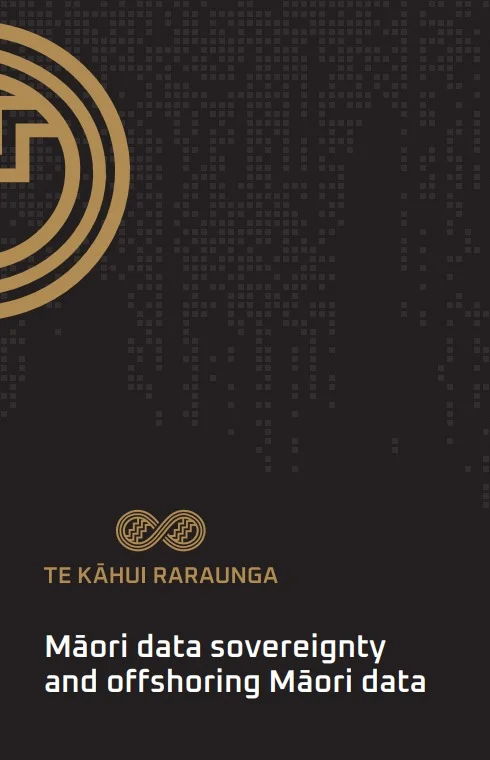
Māori data sovereignty and offshoring Māori data
(En anglais seulement) Government agencies in Aotearoa New Zealand are increasingly offshoring their data, citing greater security and reduced cost as key factors.
As the government accelerates its digital transformation strategy across the public service, Māori data sovereignty requirements must be central to decision making, particularly with regard to offshoring and procurement.

Number Savvy - From the Invention of Numbers to the Future of Data
((En anglais seulement) This book is written for the love of numbers. It tells their story, shows how they were invented and used to quantify our world, and explains what quantitative data mean for our lives. It aspires to contribute to overall numeracy through a tour de force presentation of the production, use, and evolution of data.Understanding our physical world, our economies, and our societies through quantification has been a persistent feature of human evolution. This book starts with a narrative on why and how our ancestors were driven to the invention of number, which is then traced to the eventual arrival at our number system. This is followed by a discussion of how numbers were used for counting, how they enabled the measurement of physical quantities, and how they led to the estimation of man-made and abstract notions in the socio-economic domain. As data don’t fall like manna from the sky, a unique feature of this book is that it explains from a teacher’s perspective how they’re really conceived in our minds, how they’re actually produced from individual observations, and how this defines their meaning and interpretation. It discusses the significance of standards, the use of taxonomies, and clarifies a series of misconceptions regarding the making of data. The book then describes the switch to a new research paradigm and its implications, highlights the arrival of microdata, illustrates analytical uses of data, and closes with a look at the future of data and our own role in it.
Apprentissage
Récits des données du GC
Découvrez les données en action au sein du gouvernement du Canada.
Les kiosques virtuels des partenaires de la Communauté des données du GC
Visitez les kiosques virtuels pour vous renseigner sur les principaux projets ou initiatives en matière de données des organisations du GC. Ces kiosques ont été créés par les partenaires de la Communauté des données du GC, qui y présentent ce sur quoi ils travaillent. Ils se trouvent également dans la zone d'exposition virtuelle de la Conférence sur les données du GC 2023.
Découvrez plus sur les données 2022
Accédez à une collection de plus de 80 liens liés aux données, sélectionnés par les conférenciers, les partenaires, les participants et les organisateurs de la Conférence sur les données du GC 2022.

GFlowNets and AI for Science presentation - Princeton AI Club
(En anglais seulement) Machine learning research is expanding its reach, beyond the traditional realm of the tech industry and into the activities of other scientists, opening the door to truly transformative advances in these disciplines. In this talk I will focus on two aspects, modeling and experimental design, that are intertwined in the theory-experiment-analysis active learning loop that constitutes a core element of the scientific methodology. Computers will be necessary to go beyond the currently purely manual research loop and take advantage of high-throughput experimental setups and large-scale experimental datasets. I will introduce a novel machine learning framework called GFlowNets (for “Generative Flow Networks”), related to reinforcement learning, generative modeling and variational methods and conceived as an ML-driven replacement for MCMC. GFlowNets were first used to propose a highly diverse set of molecular candidates and were then incorporated in an active learning framework for efficiently looking for molecules with desirable properties. More recently, we have been exploring how GFlowNets can generate not just molecular graphs but also causal graphs and Bayesian posterior distributions in function space. I will describe our research program to build on these bases and develop machine learning methodologies for efficiently exploring the space of causal theories as well as the space of experiments while characterizing the ambiguities left by finite datasets and non-identifiability, as well as our plans to apply these tools in areas of great societal need like the unmet challenge of antimicrobial resistance.
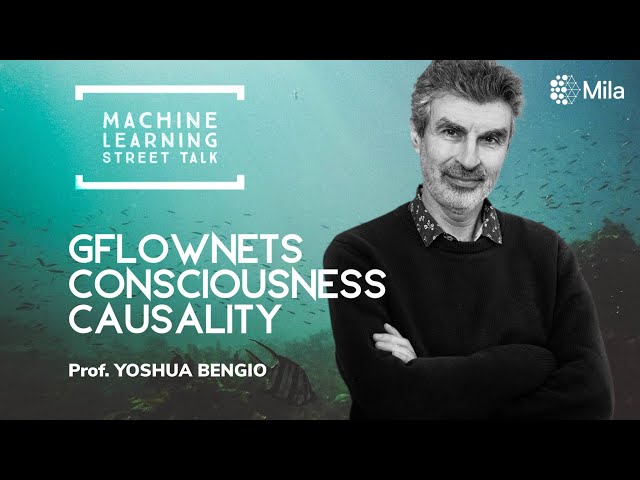
GFlowNets, Consciousness & Causality - Machine Learning Street Talk
(En anglais seulement) For Yoshua Bengio, GFlowNets are the most exciting thing on the horizon of Machine Learning today. He believes they can solve previously intractable problems and hold the key to unlocking machine abstract reasoning itself. This discussion explores the promise of GFlowNets and the personal journey Prof. Bengio traveled to reach them.
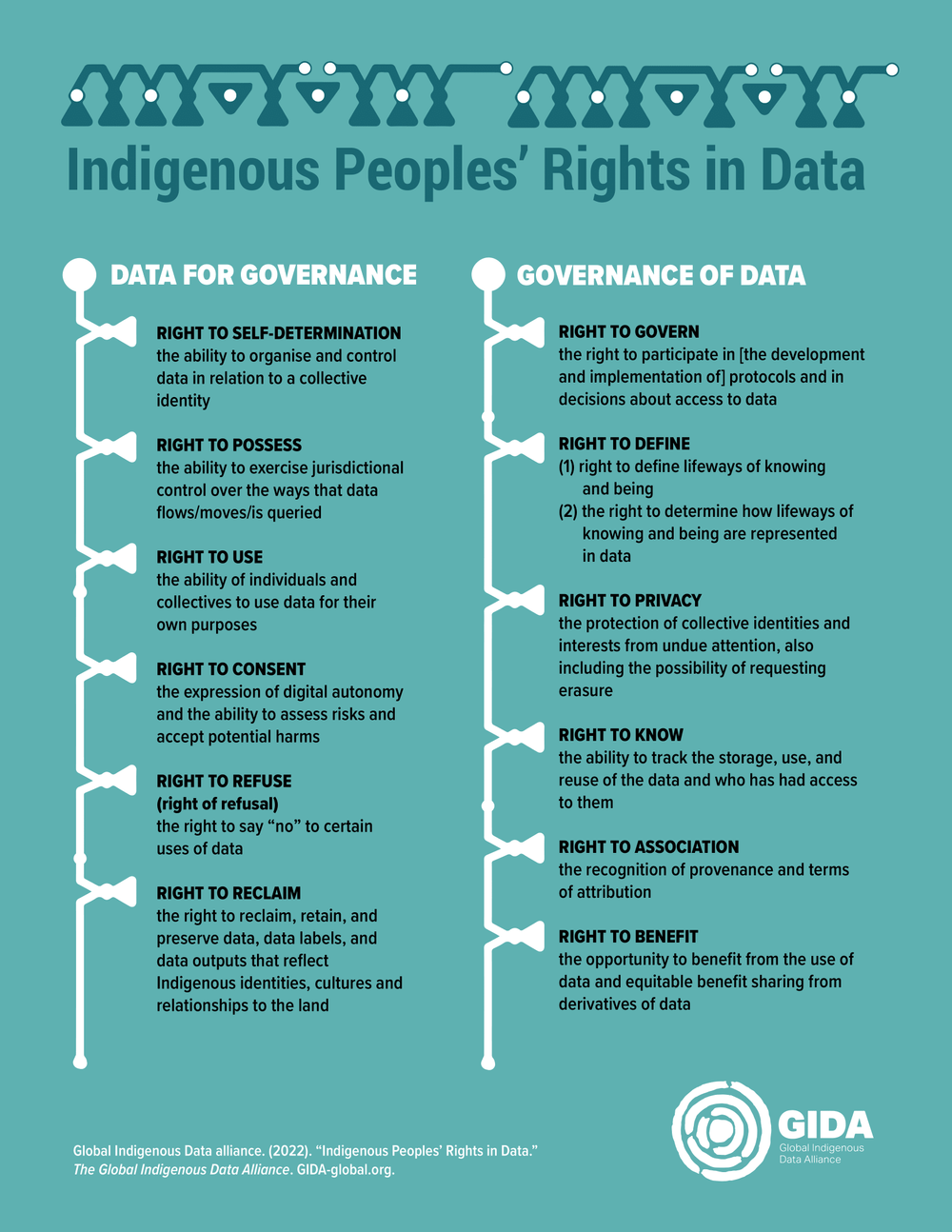
Indigenous Peoples’ Rights in Data
(En anglais seulement) Global Indigenous Data Alliance (GIDA) has developed a set of rights for Indigenous peoples’ rights in data.
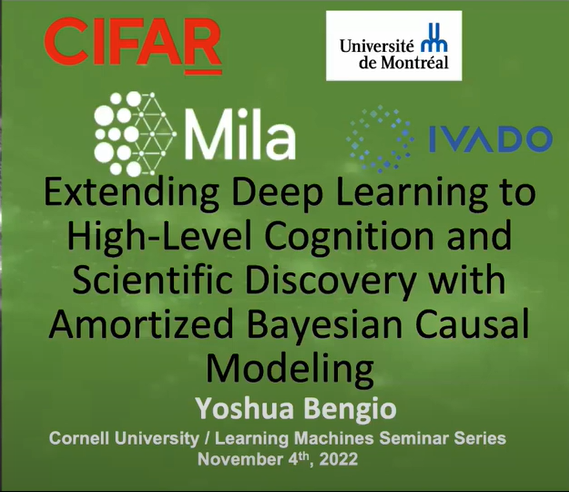
Learning Machines Seminar: Extending Deep Learning to High-Level Cognition and Scientific Discovery with Amortized Bayesian Causal Modeling
(En anglais seulement) How can what has been learned on previous tasks generalize quickly to new tasks or changes in distribution? The study of conscious processing in human brains (and the window into it given by natural language) suggests that we are able to decompose high-level verbalizable knowledge into reusable components (roughly corresponding to words and phrases). This has stimulated research in modular neural networks where attention mechanisms can be used to dynamically select which modules should be brought to bear in a given new context. Another source of inspiration for tackling this challenge is the body of research into causality, where changes in tasks and distributions are viewed as interventions. The crucial insight is that we need to learn to separate (somewhat like in meta-learning) what is stable across changes in distribution, environments or tasks and what may be separate to each of them or changing in non-stationary ways in time. From a causal perspective what is stable are the reusable causal mechanisms, along with the inference machinery to make probabilistic guesses about the appropriate combination of mechanisms (maybe seen as a graph) in a particular new context. What may change with time are the interventions and other random variables which are those that yield more directly to observations. If interventions are not observed (we do not have labels for fully explaining the changes in tasks in terms of the underlying modules and causal variables) we would ideally like to estimate the Bayesian posterior over the interventions, given whatever is observed. This research approach raises many interesting research questions ranging from Bayesian inference and identifiability to causal discovery, representation learning and out-of-distribution generalization and adaptation, which will be discussed in the presentation.

The GFlowNet Tutorial
(En anglais seulement) A GFlowNet is a trained stochastic policy or generative model, trained such that it samples objects x through a sequence of constructive steps, with probability proportional to a reward function R(x), where R is a non-negative integrable function. This makes a GFlowNet able to sample a diversity of solutions x that have a high value of R(x).

Principles of Māori Data Sovereignty
(En anglais seulement) This Te Mana Raraunga (TMR) Brief provides a general overview of key Māori Data Sovereignty terms and principles.
Il nous manque quelque chose ? Envoyez-nous les détails : Communauté des données du GC
Communauté des données du GC | Contactez-nous | Inscrivez-vous | Joignez-vous à nous sur GCcollab | Partenaires
